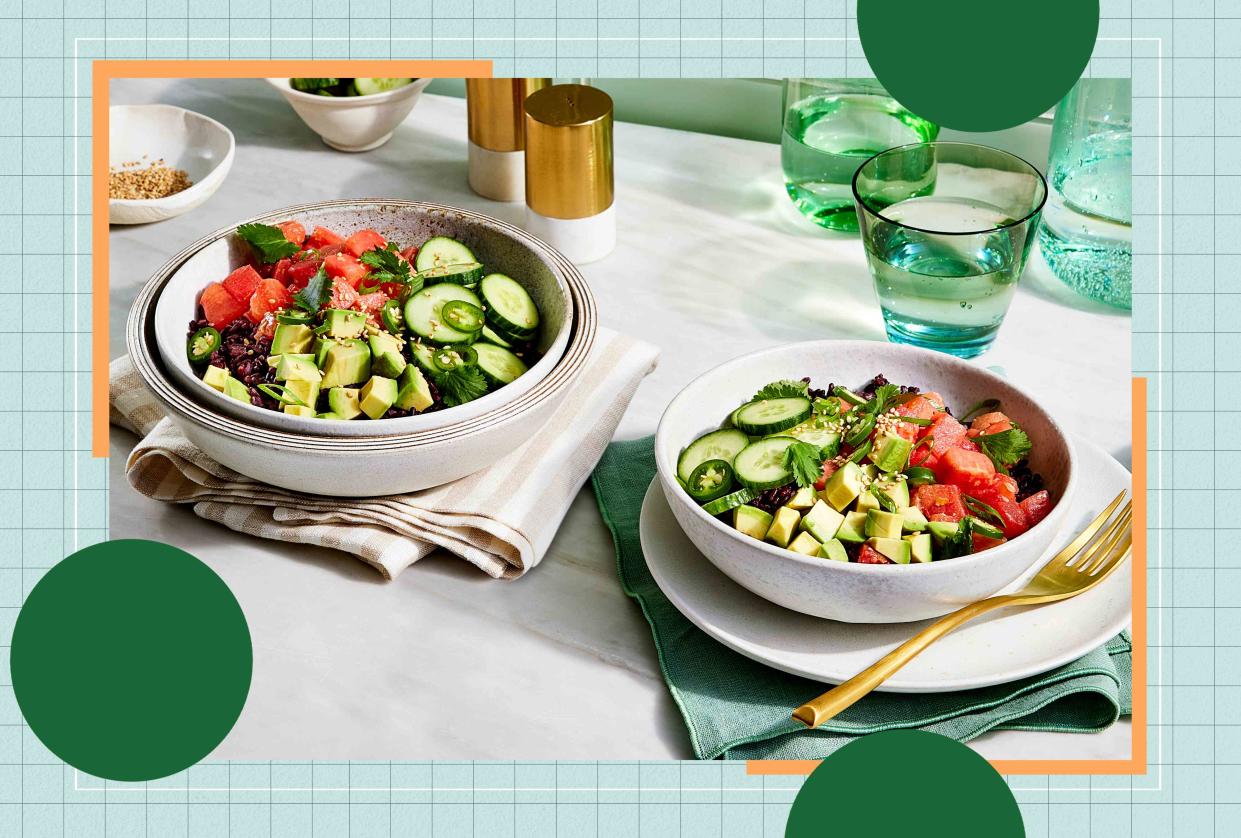5 Foods That Are Packed with Electrolytes, According to Dietitians
Electrolytes aren’t just found in sports drinks. You can get them from lots of nutritious foods, too.

PHOTOGRAPHER: JEN CAUSEY, FOOD STYLIST: RUTH BLACKBURN, PROP STYLIST: SHELL ROYSTER
Reviewed by Dietitian Jessica Ball, M.S., RD
Electrolytes are a trending topic in the nutrition and wellness world, and for good reason. They play a role in many bodily processes that are crucial for functioning at our best. That said, they naturally occur in many whole foods, so most people don’t need electrolyte beverages to meet their needs. We talked to nutrition experts to learn which foods are packed with electrolytes and why they’re so important for health.
Related: Does Consuming Too Many Electrolytes Cause Side Effects? Here's What Dietitians Say
What Are Electrolytes?
Electrolytes are a group of charged minerals including sodium, phosphate, potassium, calcium, magnesium and chloride. For your body to function properly, it needs both fluids and electrolytes.
According to Rhyan Geiger, RDN, a Phoenix-based dietitian, “Electrolytes help your brain communicate with nerves and muscles to fire off signals for everyday movements, from blinking to lifting weights.”
These essential minerals play a large role in muscle contraction. “Without calcium and magnesium, your heart cannot contract and relax correctly,” says Geiger.
Electrolytes also support hydration, regulate fluid balance and maintain proper pH levels in your blood and cells.Electrolytes are lost through sweat and urine. You may experience excess loss of electrolytes due to illness or extended periods of strenuous exercise.
5 Foods That Are Packed with Electrolytes, According to Dietitians
1. Spinach
Spinach is a nutrient-rich food full of electrolyte minerals. A 1-cup serving of spinach provides around 167 milligrams of potassium, 24 milligrams of magnesium and 30 milligrams of calcium.
“Leafy greens like spinach are also rich in antioxidants that may help reduce cognitive decline, aid in wound healing, and lower the risk of age-related macular degeneration, though more research is needed,” says Kelsey Costa, M.S., RDN, a registered dietitian and founder of Dietitian Insights.
Krista Wale, RD, LDN, a registered dietitian and spokesperson for Dietitian Insights, shares, “Spinach can be effortlessly added to salads, smoothies, omelets, stir-fries and soups, making it a perfect addition to any meal to increase your electrolyte intake.”
Eating spinach raw or steamed is the best way to get the most nutrients from these electrolyte-packed greens. Try our delicious Sesame Shrimp Stir-Fry with Spinach or this Spinach-Strawberry Salad with Feta & Walnuts.
2. Bananas
Bananas are packed with electrolytes. Taylor Janulewicz, RDN, owner of My Cancer Dietitian, suggests including bananas in your diet for a pre-workout boost. “They provide potassium, which is crucial for muscle function,” she adds. One small banana (about 100 grams) has 358 milligrams of potassium.
Bananas are also a good source of fiber, providing 3 grams per serving. Fiber is important for supporting digestive health and promotes healthy blood sugar levels. Try these delicious Banana Bread Overnight Oats for a breakfast that will keep you full and satisfied all morning.
3. Avocados
Avocados are a versatile and electrolyte-rich food. “Usually bananas are considered the main source of potassium,” Geiger tells EatingWell, but avocados provide an impressive 728 milligrams of potassium per fruit.
“Avocados not only have electrolytes but are also a good source of healthy monounsaturated fats for heart health and fiber for gut health,” says Geiger.
We love avocados spread on toast (like in this Salsa-Topped Avocado Toast), in a wrap (like this Cucumber Avocado Wrap) or in a smoothie. Or try our electrolyte-packed Spinach-Avocado Smoothie that packs 1,295 milligrams of potassium, 238 milligrams of sodium and 554 milligrams of calcium.
Related: What Happens to Your Body When You Eat Avocado Every Day
4. Dried Figs
Dried figs are rich in the electrolytes calcium and potassium. A ½-cup serving (about 100 grams) of dried figs has 162 milligrams of calcium and 680 milligrams of potassium.They’re also rich in antioxidants and support strong bones.
“Dried figs are easy to snack on and also boost daily fiber intake by 4 grams per ¼-cup serving,” adds Geiger. They also make a great addition to salads and oatmeal, plus they’re a great way to add natural sweetness and more fiber to yogurt, like in our Fig & Honey Yogurt.
5. Watermelon
Watermelon isn’t just refreshing and delicious, it’s also a good source of potassium and magnesium, two electrolytes that are key to muscle and nerve function. One cup of watermelon provides 170 milligrams of potassium and 15 milligrams of magnesium.
You can enjoy watermelon fresh, as juice (try this Watermelon Mint Mocktail) or frozen for a popsicle-like snack or dessert. It also makes a tasty addition to summer salads like in this Watermelon, Cucumber & Feta Salad.
Related: Can You Freeze Watermelon?
The Bottom Line
Electrolytes are essential minerals the body needs for many functions including muscle contraction, maintaining fluid and pH balance, and nerve signaling. Electrolytes are found naturally in many foods, like avocados, watermelon, spinach and more. Contrary to what you may have heard, most people can meet their electrolyte needs through a balanced diet that includes a variety of fruits and vegetables.
Frequently Asked Questions
How do you replenish electrolytes quickly?
To replenish electrolytes quickly, drink a hydrating beverage containing water and electrolytes. Drinking an electrolyte-rich beverage like coconut water is one of the fastest ways to replenish electrolytes because it contains sodium, potassium, magnesium and water.
What fruits are high in electrolytes?
Foods that are high in electrolytes include bananas, watermelons, avocados, strawberries, figs and oranges.
What are the symptoms of lacking electrolytes?
Symptoms of electrolyte imbalance may include dizziness, fast or abnormal heart rate, confusion, irritability, nausea, vomiting and lethargy.
Read the original article on Eating Well.






